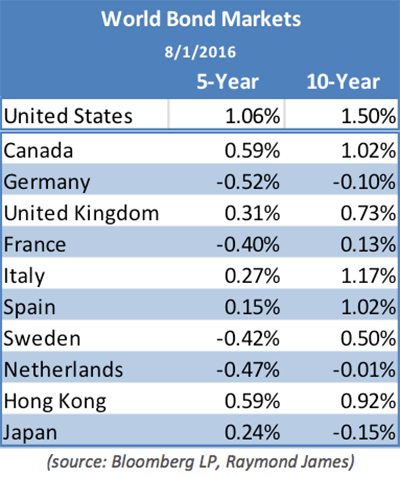Continued pressure on lower rate environment
by Doug Drabik, Fixed Income, Raymond James
August 1, 2016
Gross Domestic Product (GDP) was reported last week at 1.2% for the 2nd quarter, well below the anticipated estimate of 2.5%. The average annual U.S. growth rate of 2.1% since the end of the recession makes this the weakest expansion pace since 1949. This year is tracking at a mere 1% growth. The Fed did nothing with interest rates during last week’s FOMC meeting. The probability of a rate hike by year end is around 38%, not climbing above 50% probability until mid-2017.
Lackluster economic data is not the only deterrent in seeing interest rates in general make any significant upward move. We can’t escape the fact that global politics and economics affect our interest rates. The central banks of Europe and Japan (ECB and Bank of Japan) continue with quantitative easing, keeping interest rates at historic lows in their respective countries. With nearly $13 trillion of negatively yielding sovereign debt around the world and no sign that this attempted stimulus is having the desired result of arousing economic activity, investors continue the quest for higher returns somewhere. As dismal as interest rates may appear here in the U.S., from a global perspective, they surpass any alternatives, thus foreign demand for U.S. bonds continues to put downward pressure on rates. All of this pressure reminds investors that staying true to their plan, remaining invested in a well-laddered portfolio of high quality individual bonds provides benefits. Their overall yield from this laddered ‘time-in-the-market’ strategy continues to be higher than attempts to ‘time the market’ holding excess cash and short term investments.
Since 1990, the average spread between the German and the U.S. 10-year rate has been 34 basis points (bp). Today it is 159bp. Italy and Britain have average higher rates than the U.S. during this period and now are 33bp and 77bp lower respectively. The flight to safety and yield here in the U.S. is not likely to subside as long as these global discrepancies exist.
Copyright © Raymond James












